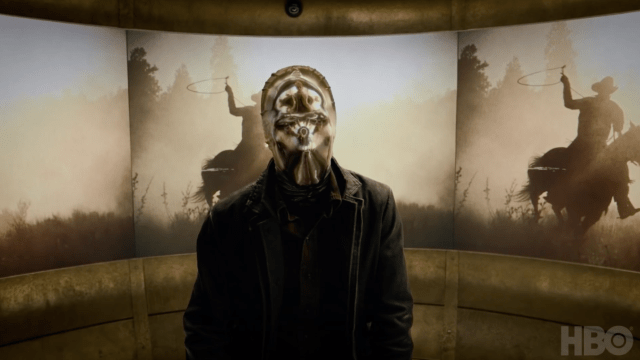The more we see and hear about Damon Lindelof’s upcoming Watchmen series, the more it becomes obvious that while the show is still set in the same world as Alan Moore and Dave Gibbons’ original comic, it really is its own distinct narrative that’s trying to use costumed vigilantes to explore a new set of ideas about society.
Though Doctor Manhattan is still out there somewhere playing god and being a general bore, Watchmen’s set to focus specifically on a police officer named Angela who adopts a masked identity in the same way that more and more people seem to be doing in this strange world that’s been fundamentally changed by the presence of vigilantes.
There are regular criminals who rob stores in capes, and dutiful police officers decked out in their best Silk Spectre colours who are ready to apprehend them. But there are also more insidious groups, like the terrorists who’ve styled themselves after Rorschach who pose the kind of threats that Angela and her team are tasked with handling.
While the trailers for the show have all been packed with clues and hints about where the series it’s going, much of the promotional footage has been somewhat open to interpretation.
In a recent interview with Entertainment Weekly, Lindelof suggests that that sort of feeling is going to be a core part of how people experience Watchmen.
Major plot points, Lindelof explained, are going to be purposefully shrouded in mystery as the season progresses in order to keep viewers guessing about what’s going to happen next and whose perspective the larger story is actually being told from:
“You should be in exactly the place that you are at the end of the pilot, which is: ‘I’m not sure what he’s talking about yet.’ By the end of the sixth episode, it will be clear who I was talking about. There won’t be any space for debate. I think people will start to theorise who I was talking about prior to the sixth episode, but that’s the one that makes the subtext text.”
Fond of subtext as Lindelof may be, Watchmen also features a significant amount of textual world building that explains how the show’s slightly left-of-centre reality came to be. Some of the most obvious differences between Watchmen’s reality and our own is the lack of the internet and cell phones, which are illegal, and the proliferation of green, sustainable energy across the world — a byproduct of Dr Manhattan’s brief time on Earth. But Lindelof emphasised that some of the most important bits of history establish the context the series exist in.
The reason police officers are able to wear masks, Lindelof said, ties back to the Tulsa Race Riot of 1921, an actual event involving hordes of enraged white Oklahomans storming Tulsa’s predominantly-black Greenwood district, causing massive amounts of destruction and murdering hundreds.
Lindelof admitted that he grounded the show to the riots in Tulsa specifically as a means of teaching a larger audience about it, but it’s what the series does with how the riots change the world where things get… interesting.
In the wake of the riots, a liberal government led by President Robert Redford (who is not played by the actor Robert Redford, weirdly) moves to address America’s legacy of racism via reparations, and the social fallout caused by the legislation necessitates a radical change to the way the police interact with the public:
“There’s also this legislation that’s passed, Victims Against Racial Violence, which is a form of reparations that are colloquially known as ‘Redford-ations.’ It’s a lifetime tax exemption for victims of, and the direct descendants of, designated areas of racial injustice throughout America’s history, the most important of which, as it relates to our show, is the Tulsa massacre of 1921.
That legislation had a ripple effect into another piece of legalisation, DoPA, the Defence of Police Act, which allows police to hide their face behind masks because they were being targeted by terrorist organisations for protecting the victims of the initial act. So … good luck sound biting that!”
From the sounds of things Lindelof is trying to do… a lot. A whole lot. And that’s admirable, but whether the series actually ends up having something interesting to say about real world racism, police brutality, and the ways in which our political system has failed those who need its protection most remains to be seen.
Watchmen hits Fox Showcase on October 21 in Australia.
